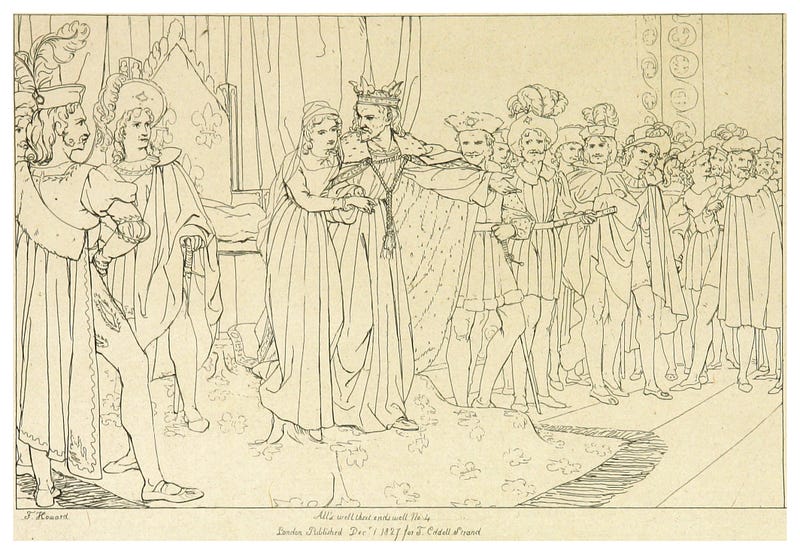
Illustration by Howard Frank
On Saturday and Sunday evening, Bare Naked Theatre put on a production of William Shakespeare’s
All’s Well That Ends Well
as their annual Shakespeare in the Amphitheatre performance. Many people came out for the tradition, and the large audience extended back into the lawn, facing the pond in front of the Kennedy Arts Center. The space was perfect for the performance on Saturday as the performers comedically broke the fourth wall and interacted with audience members,at times chastising them and at times offering them up for marriage to performers.
The set consisted of two wooden partition walls that shielded the performers and benches that were moved on and off of the grass stage. The performance was very minimalistic and casual; for example, instead of quieting the audience, the play simply began with a song. The eleven student performers, under the direction of Frankie Outlaw ’18 and Caitlin McQuade ’18, rehearsed on campus from mid-August until the performance dates.
The play had many different plots and characters that intertwined with one another throughout the two-hour-long performance. The play is filled with tragedy that was delivered very humorously. Helen (Caitlin McQuade ’18), a poorly-situated woman who works for a Countess (Taylor Wallace ’19), falls in love with the Countess’ son, Bertram (Jack Martin ’19), and is desperate for his affection. She uses her wit to make herself useful to the sick king (Jojo Rineheart-Jones’20). Rinehart-Jones made the King’s ailment come to life in a light-hearted and funny way. Using her deceased father’s medical receipts, Helen is able to bargain with the king.
Helen makes the deal that if she can cure the king of his ailment, she can choose a husband to marry regardless of class. She is successful in her end of the deal, and the king grants her wish to marry the Countess’ unwilling son, Bertram. McQuade’s performance was witty and captivating; she impressively held the stage whenever she was on it and fully committed to the ailment of the character. As the play progresses, the Countess’ apathy towards Helen is evident, and Bertram’s even more so. Wallace was very composed on stage, holding her hands tightly in front of her, and used her acting to assert her character’s superiority, while Martin worked well to project throughout the outdoor space and set aside his character’s pompous complex. He runs away, saying he will only return if Helen is pregnant with his child (which is impossible because the two never consummated their marriage).
Helen then develops a very convoluted plan to make Bertram impregnate her, and comedy and tragedy ensue. Thankfully, throughout this thick plot, the performances by these actors was helpful enough to make it more clear. During these scenes, subplots with a court naive (Corinne Russell ’20) and a man name Parolles (Noelani Stevenson ’19) provided a lot of humorous interaction with the audience. In the end, everyone supposedly ends up happy. Helen coerces Bertram into being a present husband, the Countess successfully marries off her unhappy son, and even other people wind up together. Hence, “all’s well that ends well,” but really the play did not end well for many of the characters. And all the actors certainly showed the tragedy and irony in the seemingly well-ended play.
